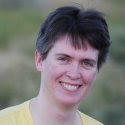I titled this "What Women Want" because I believe that women are the target audience for my examples or at least the primary one. To me, that's a bit scary and you'll see why if you read a bit further.
Of my reading pile, this covers Angry Housewives Eating Bon Bons by Lorna Landvik and 2 Harlequin Next books (Riggs Park by Ellyn Bache and Old Boyfriends by Rexanne Becnel).
I'm putting these three books together though I did not read them in this order for a very simple reason: they are all about damaged women. Did I enjoy the books? Yes. I had some issues with them, but overall, they were good reads individually. What struck me most about them though, and this could be a proximity issue, was that the female characters almost all suffered from some kind of spousal abuse varying from being ignored and infidelity to physical violence. Those few that had good relationships got to suffer the death of their spouses or a fatal disease such as cancer, or both. Again, I might have thought it was a chance thing, except that I spent last year, at my husband's request ;), watching Desperate Housewives and now this year the new ShowTime program WEEDS. It shows the same pattern of broken women. The main character's husband died and the secondary female character not only has a husband who ignores her and who is sleeping with someone else, but she also has breast cancer that was discovered late.
Not really about the books at all, but this concept of what appeals to the American public and specifically the American woman is a little disturbing to me. What about Shirley Valentine where a woman who stagnated in her life went off to discover adventure? Oh, wait. I think that was a British author. Which leaves me with the grand impression that people are no longer interesting in and of themselves. It is the scars they have, the burdens they bear and how, if at all, they're surviving these things that appeals.
I look back over that last sentence and find myself agreeing with it in general. The problem I have is that the characters all have the same scars, the same burdens. Has spousal abuse became the common thread that connects us? Has it become so prevalent that what provoked responses of "try harder" or "you don't deserve him anyway" so recently is now an automatic sympathy call? Or are people still ignoring the cry for help under lame excuse after lame excuse from their next door neighbor in favor of devouring book after book where the main characters attempt to rediscover life after abuse or to survive it?
Sigh. Not quite a book review or reviews. More a rant. Whether because of this growing discomfort with the setup, or because they really weren't my type of book to start out with, this is the strongest impression I came away with. One of the Next books had a plot thread I really enjoyed and could have read a whole book about that relationship. The concept of a reluctant man being pursued by a persistent woman as a positive thing is rare enough in romance to feel fresh to me. And I liked the ending to another plot in that same book as well. Was the abuse necessary for either of these threads? No. Was it in fact necessary for any of them? Yes, but only the one where the wife believes her husband is cheating on her.
So why the whole abuse setup? Is it a free ticket to character sympathizing? Is it necessary for practically every character in the novel to be suffering some dramatic abuse or disease? Is someone wanting to change, to get their life in order, to recover what was lost no longer remotely interesting? And what does that say about us as an audience? My examples span prime time television, a mainstream novel and Harlequin's new romance/mainstream line.
Someone on Romancing the Blog mentioned how the basic Harlequin has become more and more graphic as time goes on to the point that they cannot be given to 13-14 year old girls with a clear conscience (I looked for the link but can't find it). I see the same trend with the thriller romance and now this.
Romances used to raise girls' expectations, give them hope and discourage settling for the first guy to smile at you. Now? They tell you the world is a crazy, dangerous place in which, if you're lucky enough to survive, you might still find someone who won't beat you, stalk you, or murder you. I have no answers. I just write it as I see it and I'm not happy with what I see.
Sunday, September 18, 2005
Subscribe to:
Comments (Atom)







